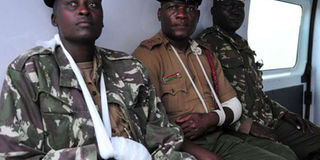Caring for injured police is a matter of national security

Injured Administration Police officers look on while sitting in an ambulance in Nairobi to receive medical treatment on May 24, 2016, following clashes with opposition protestors, who were demanding removal of the Independent Electoral and Boundaries Commission electoral body, ahead of next year's election in Nairobi. PHOTO | AFP
What you need to know:
- Rioters beat many police officers, disabled their communication gadgets, vandalised vehicles, and confiscated truncheons and firearms.
- The rioters breached police station walls, provoking officers to use their remaining firearms to shoot in the air to disperse them.
- Four people were accidentally killed by stray bullets as they attempted to storm different police stations in Kisumu and Siaya.
- Many of the highly trained hooligans targeted the left arms of police officers on duty that day to prevent them from shielding themselves.
Six thousand violent demonstrators, equally split between Kisumu and Siaya, confronted a paltry 147 police officers in two counties in Nyanza during riots this week.
They overran and beat many officers to within an inch of their lives, disabled their communication gadgets, vandalised vehicles, and confiscated truncheons and firearms. The rioters breached police station walls, provoking officers to use their remaining firearms to shoot in the air to disperse them since this was not a football match.
Four people were accidentally killed by stray bullets as they attempted to storm different police stations planned for construction in Kisumu and Siaya. A few others who were hospitalised with gunshot injuries were attempting to steal police bullets by hiding them in their bodies. Significantly, one police officer was shot, meaning that the rioters had many hidden guns and are responsible for all gunshots in Kisumu and Siaya on that day.
The unruly and riotous mobs, who were initially armed with stones, sticks and other crude items of witchcraft, refused to protest peacefully and instead employed violent language, force and other unconstitutional means to demand the resignation of the Independent Electoral and Boundaries Commission.
They lit bonfires, destroying many tyres that would otherwise have been used to carve sandals for their poverty-stricken children, and prevented traders from opening their businesses.
Many of the highly trained hooligans targeted the left arms of police officers on duty that day to prevent them from shielding themselves. There is a general belief among the hooligan population that cutting, bruising and breaking the bones of an officer would at best result in the loss of chlorophyll but were shocked to see red blood flowing out of their veins just like in humans. Assaults on the police are seen as only a prank whose effects can be healed by a good dose of photosynthesis.
NURSING SEVERE INJURIES
Such was the anarchy in Kisumu and Siaya that after the riots, 29 officers were admitted to various local health facilities nursing severe injuries. Of these, 10 police officers were in critical condition and were forced to carry their stretchers, slings and bandages, board an aircraft and fly to Wilson Airport, a stone’s throw from to ultra-modern Nairobi West Hospital for specialised care.
The former Nyanza Province, where Siaya and Kisumu fall, is an extremely hostile political environment for police officers to work. Here, public support for government cannot be bought, borrowed, cajoled or stolen. Police officers posted here have to be alert all the time since they are in enemy, anti-government territory.
Enemies of the police were stunned by the stoicism and bravery of the officers who insisted on getting off their stretchers, standing erect and saluting the Inspector-General alongside other service superiors when they landed in Nairobi.
Ignorant people keep asking why these men who daily place their lives on the line were not treated in Siaya or Kisumu. The answer is simple, really: You do not take officers injured on the field of battle into the care of doctors and nurses whose pay comes from the enemy.
Governors, who are not in government, and have been leading demonstrators against the Independent Electoral and Boundaries Commission, control the hospitals in their counties since health is a devolved function under the Constitution.
It would be foolhardy to expect professional medical treatment for police officers, who are enemy combatants in the counties, when local leaders keep claiming that they have unlawfully shot and killed protesters. An officer could be admitted to hospital with a broken rib and succumb to malaria or typhoid.





